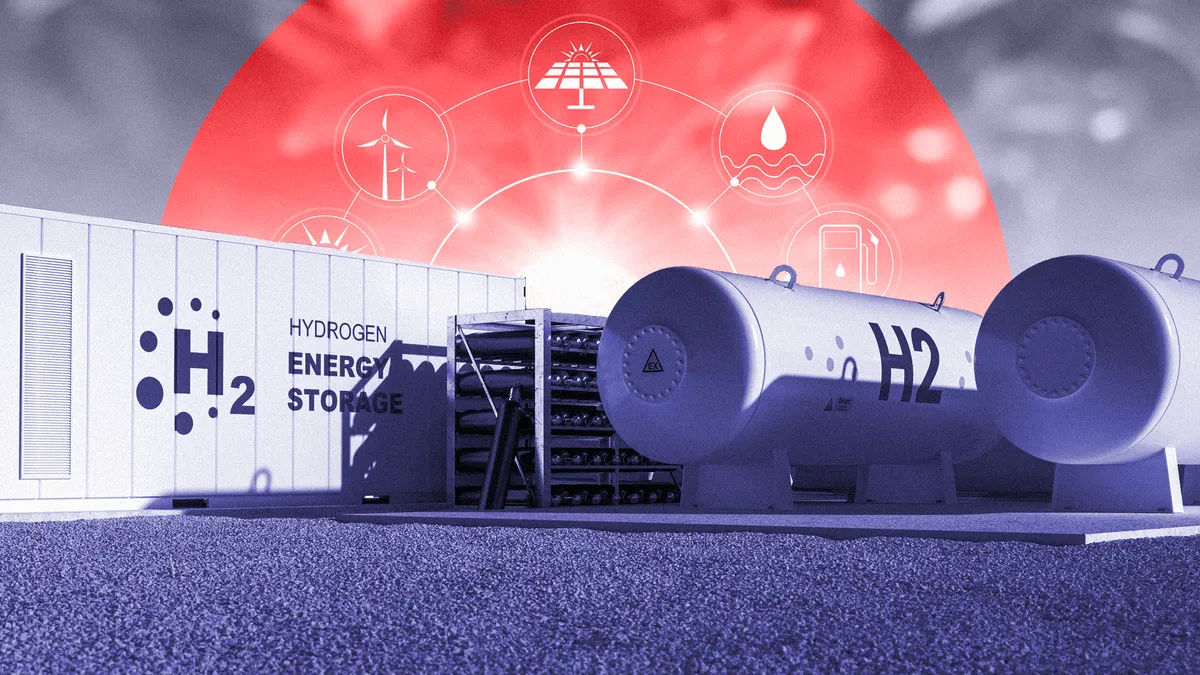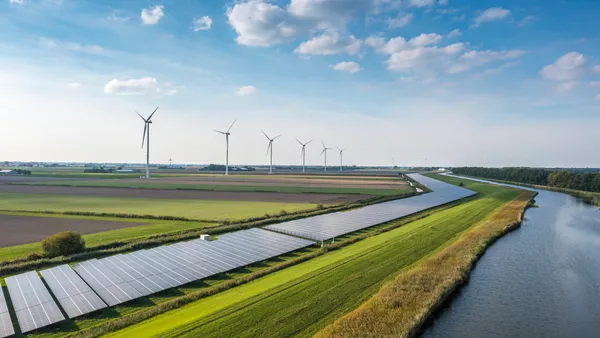Dive Brief:
-
HyDeal Los Angeles, a green hydrogen initiative launched in Los Angeles on Monday, aims to bring the cost of hydrogen fuel to $1.50/kg by 2030. At that price, to achieve 100% renewable energy, blended electricity from a hydrogen-fueled turbine and long term low cost wind and solar PPAs could run about $35/MWh.
-
In the project's first phase, set to take place over the next three months, the partners plan to identify potential industrial-scale applications for green hydrogen in the LA Basin and develop an infrastructure plan to connect them to hydrogen production and storage.
-
"Our hypothesis is, in a strategically targeted location, if you can aggregate offtakers you can scale up faster," said Janice Lin, founder and president of the Green Hydrogen Coalition. "You can afford the infrastructure and reduce cost substantially."
Dive Insight:
A new initiative launched today by the Green Hydrogen Coalition aims to resolve what Lin describes as the chicken-and-egg problem of green hydrogen. Without needed infrastructure, green hydrogen remains too expensive for wide-scale adoption. But because hydrogen fuel is cost-prohibitive, there's no incentive to build the infrastructure needed to bring costs down.
HyDeal Los Angeles will be the first, but likely not the last, initiative to take place under the HyDeal North America heading, according to Lin. Modeled after the HyDeal Ambition project launched by 30 European companies, Lin said HyDeal North America will serve as a "commercialization platform" for green hydrogen, bringing key players together to develop infrastructure and cut costs all at the same time.
"This coalition is bringing together the parties because none of us can do this alone," said Paul Browning, president and CEO of Mitsubishi Power Americas, which plans to build a large hydrogen storage operation in Delta, Utah and has joined the HyDeal initiative. "We can't do this alone. We need a pipeline company like SoCalGas to help deliver the hydrogen to the locations in LA that are going to use hydrogen. We need an offtaker who will purchase that hydrogen to get projects financed. And they need us because we're the technology provider and also potentially the green hydrogen provider from our salt dome in Utah."
The HyDeal partnership has also attracted environmental NGOs, including the Natural Resources Defense Council, which sees potential for hydrogen to provide carbon-free energy in applications where electrification is not feasible. Rachel Fakhry, an analyst for NRDC's climate and clean air program, said the group plans to participate in HyDeal both to promote more rapid deployment of hydrogen in appropriate applications — and to ensure it isn't used to derail electrification efforts or the adoption of electric vehicles.
"Overall we do think it's an interesting fuel, and we need to start pushing for deployment in this decade," Fakhry said. "We will be highly engaged to ensure that the environment and pollution overburdened communities are prioritized across the board, and we're confident it will be a healthy dialogue."
The first phase of the project, which will take place over the next three months, will quantify the potential demand for green hydrogen in the LA Basin, create a system map of where potential offtakers and infrastructure already exist and develop term sheets for future transactions.
"This whole exercise is laying the foundation, so that competitive procurement and contracting can happen as fast as possible with a high degree of success," Lin said.
While phase one will focus on power generation and transportation, future phases of the project will look for ways to bring hard-to-decarbonize industries, such as steel, cement and aviation, into the fold. A final phase will consider options to make the Port of Los Angeles "the gateway for exporting hydrogen to other countries around the world."
Lin said the Green Hydrogen Coalition identified LA as the best candidate for its first HyDeal collaboration, given the progress the city has already made toward commercializing green hydrogen. LA is one of the partners in the Intermountain Power Plant in Delta, Utah, which is in the process of converting from coal to hydrogen fuel, and Los Angeles County already has a growing network of hydrogen fueling stations. On Friday, California Gov. Gavin Newsom also announced that a planned $912 million grid modernization package would include funding for green hydrogen production.
The Los Angeles Department of Water and Power, one of the HyDeal partners, believes hydrogen will play an important role in powering the city when it achieves its 100% renewable energy target by 2035, according to Jason Rondou, director of LADWP's Clean Grid LA division. The city's LA 100 study, conducted in partnership with NREL, found that no matter what pathway the city took, LA would need some form of local renewable fuel to maintain reliability at 100% clean energy.
"LA alone cannot drive the innovation and cannot drive that cost down, but we can lead the way, and this is part of us leading the way," Rondou said. "That's going to be critical for us to get to 2035 in a way that's reliable and affordable."
Clarification: A previous version of this article shared an internal deadline for cost parity between hydrogen and other resources. The HyDeal Los Angeles initiative is aiming to make the resource cost competitive by 2030.
Correction: A previous version of this story erred in describing the sources of electricity in cost estimates from the Green Hydrogen Coalition. It estimates its initiative would result in a cost of $35/MWh for electricity from a combination of wind and solar PPAs and a green hydrogen fueled turbine.














